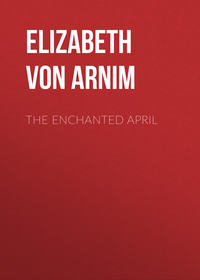 полная версия
полная версияThe Pastor's Wife
At that moment her eye was arrested by something white appearing slowly and with difficulty beneath her door. She sat up very straight and stared at it, watching its efforts to get over and past the edge of her mat. For an instant she wondered whether it were not a kind of insect ghost; then she saw, as more of it appeared, that it was a letter.
She held her breath while it struggled in. Nobody had ever pushed a letter under her door before. She grew happy instantly. What fun. Her heart beat quite fast with excitement while she waited to hear footsteps going away before getting up to fetch it. Herr Dremmel, however, must have been in his goloshes, objects from which he was seldom separated, for she heard nothing; and after a few seconds of breathless listening she got up with immense caution and went on tip-toe to the letter and picked it up.
"Why," she thought, pausing for a moment with a sort of solemnity before opening it, "I suppose this is my first love-letter."
There was nothing on the envelope and no signature, and this was what it said:
"LITTLE ONE,
"I wish to tell you that before going to my room to-night I instructed the hall-porter to order a betrothal cake, properly iced and with what is customary in the matter of silver leaves, to be in the small salon adjoining the smoking-room to-morrow morning at nine o'clock. Since no man can be betrothed alone, it will be necessary that you should be there."
CHAPTER VI
It was a perturbed betrothal, there were so many people at it.
Seven ladies besides Ingeborg appeared in the small salon adjoining the smoking-room next morning at nine o'clock. What Herr Dremmel had done, being ignorant which was Ingeborg's room and after laborious thought deciding that to demand her number of the hall-porter later than dusk might very conceivably cast a slur on her reputation, young ladies being, as he well knew, of all living creatures the most easily slurred, was to write as many copies of the letter as there were doors on her landing and thrust them industriously one by one beneath each door, strong in the knowledge that she would in this manner inevitably get one of them.
He was greatly pleased with this plan. It seemed of a beautiful simplicity and effectiveness. "Being unaware of the context," he reasoned, "no lady except the right one will be able to guess what the letter can possibly refer to. She will therefore throw it aside as an obvious mistake and think no more about it."
But the ladies did think. And none of the inhabitants of the third floor, except Mr. Ascough who never thought anything about anything, having discovered that if once you begin to think there is no end to it, and a dried and brittle little man lately pensioned off by the firm he had been clerk to and taking his first trip on the continent in a condition of profound uninterestedness, threw it aside. These two did; but the seven ladies not only did not throw it aside, they read it many times, and instead of thinking no more about it thought of nothing else. Even Mrs. Bawn, who had been a widow for six months and was heartily tired of it, was pleased. She liked, particularly, being addressed as Little One. There was a blindness about this that suggested genuine feeling. She had not been so much pleased since her dear Bawn, now half a year in glory, had told her one day, before their marriage, that he did not care what anybody said he maintained that she was handsome.
They all thought the letter very virile, and that nothing could be more gentlemanly than its restraint. Four of them expected a different male member of the party to be waiting in the small salon, the remaining three expected Mr. Ascough. Mr. Ascough had a caressing way with pats of butter and the closing of the doors of filled flys that had before now led him, on these tours, into misapprehensions. He was long since married, but had omitted to mention it. The ladies, therefore, when they arrived in the small salon at nine o'clock did not find Mr. Ascough nor any of the other four friends they expected. They found, surprisingly, each other; and, standing thick and black near a decorated table at the window and scowling in a fresh astonishment every time the door opened and another lady came in, that very undesirable fellow-tourist, the German gentleman.
Each one immediately knew it was Ingeborg who had been written to, and that the letter had gone astray. Each one also thought she knew that Ingeborg had not got the letter and would not come. But each one, except Mrs. Bawn, was helped to cover up her shock by being sure the others did not know of it; and the custom of life lying heavy on them they were able, after one little start on first seeing Herr Dremmel, to drift into the corners of the room and pretend that what they had come for was books. Except Mrs. Bawn. Mrs. Bawn saw, stared, turned on her heel, and went out again volcanically; and the corridor shook to her departing footsteps and to the angry unintentional rhymes she was making aloud with words like hoax and jokes.
With astonishment and disgust Herr Dremmel saw the seven ladies accumulate. It was most unfortunate that on that morning of all mornings the small salon, so invariably empty, should be visited. His inexperienced mind did not connect their appearance with his letters; it never occurred to him that his reasoning as to what they would do on receiving them could possibly be wrong. Nor did he, as he watched the door open and shut seven times and seven times admit the wrong woman, guess that their presence, if Ingeborg came, would immensely help his betrothal.
The ladies, fingering dusty Tauchnitzes and magazines and eyeing the table in the window with heads as much averted as could be combined with the seeing of it, gradually found the shock they had had being soothed by the interest they felt in what Herr Dremmel would do when he realised that that unladylike Miss Bullivant, all unaware of what was waiting for her, was not coming. Now that they were there they might as well stay and see the end of it. It was really very interesting in its way; so German; so unlike, thank goodness, what English people ever did. Would he stand there all day, they wondered, with that really most improperly suggestive cake, so very like a christening cake? One or two of them sat down squarely on the sofas behind months-old magazines round whose edges they peeped, making it clear to the unhappy man that they, at least, intended to stay there; and they all coughed a little every now and then in the way a waiting congregation coughs in church.
Then the door was pushed open with the jerk of somebody who is either in a hurry or has come to a sudden determination, and who should appear but that Miss Bullivant.
A thrill ran through the seven ladies, and they instantly became, behind their magazines, stiff with excitement. Chance; what a chance; she had chanced to look in; it was like a play; dear me, thought each of the seven.
And Ingeborg, who believed as lately as the last moment on the doormat outside that she had only come in order to tell Herr Dremmel she was not coming, when she saw the cake, very white and bridal, on a white cloth with white flowers in pots round it, and on either side of it a bottle with a white ribbon about its neck, and on the other for the sake of symmetry two glasses, was staggered. How could she, who so much loved to please, to make happy, cruelly hurt him, spoil his little feast, wipe out the glow, the immense relief that beamed from his face when he saw her?
She turned round quickly, realising the presence of the seven ladies. Amazed she stared at them, mechanically counting them. How could she make him ridiculous, humiliate him, before all those women?
Hesitating, torn, poised on the tip of flight, she stood there. Her hand was on the door to open it again and run; but Herr Dremmel's simplicity came to his help more effectually than the cunningest plans. He forgot the ladies, and stepping forward took her hand in his and quite simply kissed her forehead, sealing her then and there, with the perfect frankness of his countrymen when engaged in legitimate courtship, as his betrothed. He then slipped a ring he wore on his little finger on to her thumb, that being the only bit of her hand he could find that it would stay on, and he being free from prejudices in the matter of fingers, and the thing—at least so he supposed—was done.
Ingeborg in her bewilderment let these things happen to her. Her thoughts as she stood being betrothed were jerking themselves into a perfect tangle of knots. She was astonished at the tricks life stoops to. A cake and the eyes of seven women. Her whole future being decided by a cake and the eyes of seven women. Oh, no, it couldn't be. It was only that she couldn't stop now. Impossible, utterly, to stop now. She had never dreamed she wouldn't find him alone. These women were all witnesses. He had kissed her before them all. His methods were really overwhelming. Suppose her father could see her. But the kiss had been administered very ceremoniously; it had been quite cooling; such a one as even a bishop might feel justified in applying to the brow of a sick person or a young child. Later, at a more convenient time, when the pathetic cake was out of sight, when these women were out of ear-shot, she would tell him she hadn't meant....
Amazingly she found herself advancing towards the cake with Herr Dremmel and standing in front of it with him hand in hand. Oh, the mischief people got into who came up to London to dentists! She now saw what provincial dentists were for: they kept you in pain, and pain kept you out of mischief. For the first time she understood what her spirit had till then refused to accept, the teaching so popular with the Bishop that pain was a necessary part of the scheme of things. Of course. You were safe so long as you were in pain. In that condition the very nearest you could get to the most seductive temptation was to glance at it palely, with a sick distaste. And you stayed at home, and were grateful for kindnesses. It was only when you hadn't anything the matter with you that you ran away from your family and went to Lucerne and took up with a strange man positively to the extent of letting him promise to marry you.
Somebody coughed so close behind her that it made her jump. She turned round nervously, Herr Dremmel still holding her hand, and beheld the seven ladies flocked about her for all the world like seven bridesmaids.
They had hastily consulted together in whispers while she was being led away to the cake as to whether they ought not to congratulate her. Their hearts were touched by the respectful ceremony with which Herr Dremmel had conducted his betrothal. It had had the solemn finality of a marriage, and what woman can look on at a marriage unmoved? They had agreed in whispers that this was one of those moments in which one lets bygones be bygones. The two at the altar—they meant at the cake—had no doubt said many terrible and vulgar tilings and had behaved in a way no lady and gentleman would—the girl, for instance, openly admitting she had run away from home; but what they were doing now at least was beyond reproach, and, by uniting, two blacks were after all, in spite of what people said about its not being possible, going to make one white. At any rate it was charitable to hope so.
So they cleared their throats and wished her joy.
"Thank you," said Ingeborg a little faintly, looking from one to the other, "it's so kind of you—but—"
They then shook hands with Herr Dremmel and said they were sure they wished him joy, too, and he thanked them with propriety and bows.
"Such a thing has never happened on a Dent's Tour before—oh, no, never before at all I'm sure," said the most elderly lady nervously, with a number of nods.
"There isn't time enough, that's what I sometimes think," said the young lady who had hurried her companion away to the sunset the evening before. "What's a week?" And she stared at the cake and frowned.
"Dent's had a funeral once," said a square small lady who kept her hands plunged in the pockets of a grey jersey.
"Now Miss Jewks, really—" protested the elderly lady. "One doesn't mention—"
"Well, it wasn't their fault, Miss Andrews. They didn't want to have it, I'm sure. It was a gentleman from Gipsy Hill—"
"What a beautiful—er—cake," hastily interrupted the elderly lady.
"Funny thing, I sometimes think," continued Miss Jewks, "to go for a holiday and die instead."
"Those silver leaves—" said the elderly lady, raising her voice, "I call them dainty."
"It's like a wedding-cake, isn't it?" said the young lady of the sunset, peering close at it with a face of gloom.
"Will you not, Ingeborg," said Herr Dremmel, calling her for the first time by her name, "cut the cake? And perhaps these ladies will do us the honour of tasting it."
She did not recognise him in this persistent ceremoniousness. Every trace of his usual lax behaviour was gone, his ease and familiarity of speech, and he was as stiff and correct and grave as if he were laying a foundation stone or opening a museum. They were the manners, though she did not know it, which all Germans are trained to produce on public occasions.
"Oh, thank you—"
"Oh, you're really very kind—"
"Oh, thank you very much I'm sure—"
There was a murmur of awkward and reluctant thanks. The seven ladies were not at all certain that their cordiality ought to stretch as far as cake. They had been moved by an impulse that did honour to their womanliness to offer congratulations, but they did not for all that forget the dreadful things the couple had constantly been heard talking about and the many clear proofs it had provided that it was what Dent's Tours were accustomed to describe as no class; and though they all liked cake, and were getting steadily hungrier as the Dent week drew to its close, they were doubtful as to the social wisdom of eating it. It would be very unpleasant if these people, encouraged, were later on to presume; if they were to try to use the eaten cake as a weapon for forcing their way into English society. If, in a word, when the Tour got back to England, they were to want to call.
So they took the cake reluctantly that Ingeborg, in a sort of dream, cut and offered them; and with even more reluctance they sipped the wine in which the German gentleman requested them to drink the newly betrothed couple's health.
"But—" said Ingeborg, trying to rouse herself even at this eleventh hour.
"True. There are not enough glasses. I will ring for more," was the way Herr Dremmel finished her sentence for her.
The immense official promptness of him! She felt numbed.
And when the glasses were brought there was another ceremony—a clinking of Herr Dremmel's glass with each glass in turn, his heels together as in the days of his soldiering, his body stiff and his face a miracle of solemnity; and before drinking he made a speech, the Asti held high in front of him, in which he thanked the ladies for their good wishes on behalf of his betrothed, Miss Ingeborg Bullivant, whose virtues he dwelt upon singly and at length in resounding periods, before proceeding to assure those present of his firm resolve to prove, by the devotion of the rest of his life, the extremity of his gratitude for the striking proof she had given before them all of her confidence in him; and every sentence seemed to set another and a heavier seal on her as a creature undoubtedly bound to marry him.
Dimly she began to realise something of the steely grip of a German engagement. She wondered whether there were any more room left on her forehead for further seals. She felt that it must be covered with great red things, scrawled over with the inscription:
DREMMEL'SWell, she was after all not a parcel to be picked up and carried away by the first person who found her lying about, and the minute she was alone with him she would, she must, tell him that what she had really come down for, though appearances were certainly by this time rather against her, was to refuse him. She would be as gentle as possible, but she would be plain and firm. The minute these women left them alone she would tell him.
With a start she saw that the women were leaving them alone, and that the minute had come. She wanted them not to go; she wanted to keep them there at any cost. She even made a step after them as the last one, nodding to the end, went out and shut the door, but Herr Dremmel still had hold of her hand.
When the door had finally shut she turned to him quickly. Her head was thrown back, her eyes were full of a screwed-up courage.
"But you know—" she began, determined to clear things up, however much it might hurt them both.
And again he promptly finished her sentence for her, this time by enfolding her in his arms and kissing her with a largeness and abundance which no bishop, her mind flashed as her body stood stiff with surprise and horror, could possibly approve.
She felt engulfed.
She felt she must be disappearing altogether.
He seemed infinitely capacious and soft.
"Oh, but I can't—I won't—oh, stop—oh, stop—it's a mistake—" she tried to get out in gasps.
"My little wife," was all the notice Herr Dremmel took of that.
CHAPTER VII
It was raining at Redchester when Ingeborg got out at the station a week and a day after she left it—the soft persistent fine rain, hardly more than a mist, peculiar to that much-soaked corner of England. The lawns in the gardens she passed as her fly crawled up the hill were incredibly green, the leaves of the lilac bushes glistened with wet, each tulip was a cup of water, the roads were chocolate, and a thick grey blanket of cloud hung warm over the town, tucking it in all round and keeping out any draught that might bite and sting the inhabitants, she thought, into real living.
The porter told her it was fine growing weather, and she wondered stupidly why, after the years she had had of the sort of thing, she had had not grown, then, more thoroughly herself. A retired colonel she knew —she knew all the retired colonels—waved his umbrella and shouted a genial inquiry after her toothache, and she looked at him with a dead, ungrateful eye. A passing postman touched his cap, and she turned the other way. The same sensible female figures she had seen all her life draped in the same sensible mackintoshes bowed and smiled, and she pretended she hadn't seen them. Everybody, in fact, behaved as though she were still good, which was distressing, embarrassing, and productive of an overwhelming desire to shut her eyes and hide.
There were the shops, with the things in the windows unchanged since she left nine days ago, the same ancient novelties nobody ever bought, the same flies creeping over the same buns. There was the book-seller her Christian Year had come from, his windows full of more of them, endless supplies for endless dieted daughters, vegetarians in literature she called them to herself, forcibly vegetabled vegetarians; and there was the silversmith who provided the Bishop with the crosses after a good Florentine fifteenth-century pattern he presented to those of his confirmation candidates who were the daughters in the diocese of the great. The Duke's daughter had one. The Lord-Lieutenant's daughter had one. On this principle Ingeborg herself had been given one, and wore it continually night and day, as her father expected, under her dress, where it bruised her. It was pleasant to her father to be able to recollect, in the stress and dust of much in his work that was unrefreshing, how there was a yearly increasing though severely sifted number of gentle virgin blouses belonging to the best families beneath which lay and rhythmically heaved this silver reminder of the wearer's Bishop and of her God.
"Father," Ingeborg said, after she had worn hers for a week, "may I take my cross off at night?"
"Why, Ingeborg?" he had inquired; adding quietly, "Did our Saviour?"
"No; but—you see when one turns round in one's sleep it sticks into one."
"Sticks, Ingeborg?" the Bishop said gently, raising his eyebrows at such an expression applied to such an object.
"Yes, and I'm getting awfully bruised." She was still in the schoolroom, and still saying awfully.
"By His stripes we are healed," said the Bishop, shutting up the conversation as one shuts up a book.
In spite of the wet warmth she shivered as the silversmith's window reminded her of this. It had happened years ago, but even farther back, as far back as she could remember, every time she had asked leave of her father to do anything it had been refused; and refused with bits of Bible, which was so peculiarly silencing.
And now here she was about to face him covered with the leaves she had not asked for at all but had so tremendously taken, and going to ask the most tremendous one of all, the leave to marry Herr Dremmel.
For that was how the last two days of her Dent's Tour had been spent, in being openly engaged to Herr Dremmel. She had found her attempts to explain that she was not so really availed nothing against his conviction that she was. And public opinion, the public opinion of the whole Tour, also never doubted but that she was—had not seven of its most reliable members actually seen her in the act of becoming it? In fact it not only did not doubt it, it was sternly determined that she should be engaged whether she liked it or not. It was the least, the Tour felt, that she could do. So that there was nothing for it now but to face the Bishop.
She felt cold. No amount of the familiar moist stuffiness could warm her. Vainly she tried to sit up, to be proud and brave, to recapture something at least of the courage that had seemed so easy just at the end in Switzerland with Herr Dremmel to laugh at her doubts. Her head would droop, and her hands and feet were like stones.
It was the place, the place, she thought, the hypnotic effect of it, of her old environment. The whole of Redchester was heavy with recollections of past obediences. Not once had she ever in Redchester even dreamt of rebellion. She had questioned latterly, in the remoter and less filial corners of her heart, but she had never so much as thought of rebellion. And the moment she got away out of sight and hearing of home, things she knew here were wicked had appeared to be quite good and extremely natural. How strange that was. And how strange that now she was back everything was beginning to seem wicked again. What was a poor wretch to do, she asked herself with sudden passion, confronted by these shuffling standards that behaved as if they were dancing a quadrille? This was the place in which for years her conscience had been cockered to size and delicacy; and though it had become temporarily tough in Herr Dremmel's company she felt it relapsing with every turn of the wheels more and more into its ancient softness.
Yet she undoubtedly, conscience-stricken and frightened or not, had to tell her father what she had done. She had got to be brave, and if needs be she had got to defy. She was bound to Herr Dremmel. He had only gone home to set his house in order, and then, he announced, she meanwhile having prepared the Bishop, he was coming to Redchester to marry her. Prepared the Bishop! She shivered. Herr Dremmel had tried to marry her in Lucerne; but the Swiss, it seemed, would not be hurried, so that here she was, and within the next few hours she was going to have to prepare the Bishop.
She shut her eyes and thought of Herr Dremmel; of Robert, as she was was learning to call him. With all her heart she liked him. And he had been so kind when he found she really disliked being engulfed in embraces, and had restricted his exhibitions of affection to the kissing of her hand, telling her he could very well wait till later on, sure that she would after marriage warm, as he had explained to her on the Rigi all women did, to a just appreciation of the value of the caresses of an honest man. He had also produced a number of German love-names from some hitherto fallow corner of his mind, and garnished his conversation with them in a way that made her who, nourished as she had been on the noble language of the Bible and the Prayer-book, was instantly responsive to the charm of words, laugh and glow with pleasure. She was his Little Heart, his Little Tiny Treasure, his Little Sugar Lamb—a dozen little sweet diminished German things translated straight away just as they were into English. The freshness of it! The freshness of being admired and petted after the economies in these directions practised in her home. And his ring at that very moment dangled beneath her dress on the same chain as her father's cross. Yes, she was bound to him. Duty, she perceived, could be a very blessed thing sometimes if it protected one from some other duty. It was Herr Dremmel now who had become her Duty.









